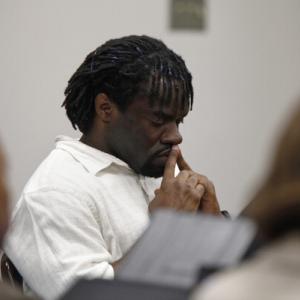Lauren F. Winner teaches at Duke Divinity School and, through Durham's Project TURN, the Raleigh Correctional Center for Women.
Posts By This Author
Marcus Robinson Spared Death Row Because of Racial Bias
North Carolina's Racial Justice Act was just a piece of legislation until this morning, when Judge Gregory Weeks set aside a death penalty sentence that had been meted out to Marcus Robinson in 1994.
At issue this morning was not whether Robinson was guilty of first-degree murder. At issue was whether “racial bias” had prevented the “fair and reliable imposition of the death penalty in North Carolina.”
Judge Weeks found that racism was indeed at work in Robinson’s sentencing. There is, Weeks said, “considerable evidence of the continuing effects of racial prejudice in the application of the death penalty.” Specifically, Weeks found that racism guided the selection of Robinson’s jury, thus compromising Robinson’s right to trial by impartial jury. In accordance with the Racial Justice Act, Robinson will now serve a term of life imprisonment without parole.
Why Ash Wednesday Belongs Out of the Church and Out on the Streets

Ashes to Ashes image via Tim/Wylio. (http://www.wylio.com/credits/Flickr/4366100883)
Repentance has a public aspect and a private aspect. Jesus speaks very clearly about doing one’s repentance in secret -- not chattering on in public about how hungry your pious fasting has left you. At the same time, the church also has a ministry to call -- publicly -- for repentance, to sometimes play the role of John the Baptist. Calls for repentance happen every week, every day, inside religious buildings, inside religious communities. Sometimes calls for repentance need to happen out on the street corners, too.
Still, this is a strange thing to do, this liturgy outside a hospital. It does not feel entirely comfortable to me -- but I am not sure anything about Ash Wednesday ever feels entirely comfortable.
Vanquishing Jane Crow
The Dream is Freedom: Pauli Murray and American Democratic Faith, by Sarah Azaransky.
Good Intentions Gone Bad
Lauren F. Winner reviews The Furnace of Affliction: Prison and Religion in Antebellum America, by Jennifer Graber. UNC Press.
Rereading Feminism
The sacred tradition of integrating feminist insight into religious texts

Tom and Kwikki / Shutterstock
Women's ongoing search, in life and texts, for equality and empowerment.
A Scrap Economy
Punching Out: One Year in a Closing Auto Plant, by Paul Clemens
Bringing Democracy Back to Life
"Blessed Are the Organized" by Jeffrey Stout
In Blessed Are the Organized, Princeton University's Jeffrey Stout argues that democracy is imperiled: "The imbalance of power between ordinary citizens and the new ruling class has ... reached crisis proportions." He means crisis in the medical sense—the moment when the patient will either get better or die.
Stout's prescription? "[M]any more institutions and communities [must] commit themselves to getting democratically organized." We need to do a lot more old-fashioned, face-to-face organizing. More broadly, we need to engage the basic practices of democratic citizenship -- voting, but also listening to one another as we describe our struggles and our deepest concerns; peacefully assembling; and petitioning for redress of grievances.
Stout offers portraits of effective grassroots organizing in places as diverse as post-Katrina New Orleans and Marin County, California. Stout finds a marvelous example of the democratic practice of assembly among Katrina survivors gathered in the Houston Astrodome. The scene there was "surreal." The PA system was dominated by celebrities such as T.D. Jakes, with his apolitical message about God's provision. Organizers realized that they needed to get microphones into someone else's hands. Eventually, a less famous pastor took a microphone and preached a different kind of sermon: "I believe God expects us to do our part of the work too ... So if you've been a leader in New Orleans ... come forward and have a conversation ... about what's happening, and about doing something." In that moment, the PA system was transformed into a means of genuinely public address. Here, Stout argues, "we see ... a motley collection of displaced citizens reconstructing the rudiments of a democratic culture on the fly."
Sabbath for All?
Pledging Allegiance
Journeying Toward Resurrection
I've grown a little cynical about Lenten devotion.
Divine Manifestations
Epiphany: It's one of the most "religious" words there is.
